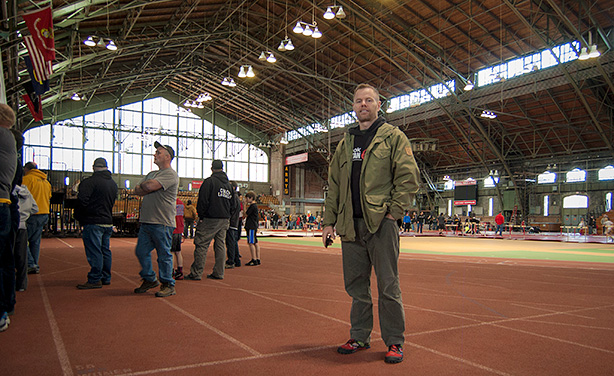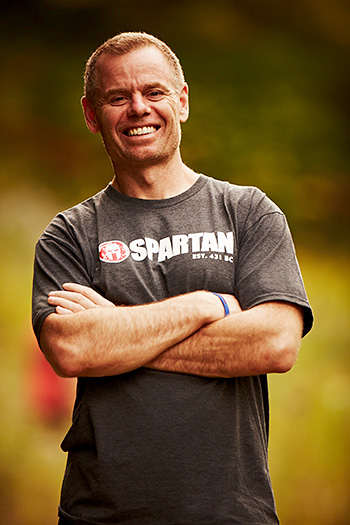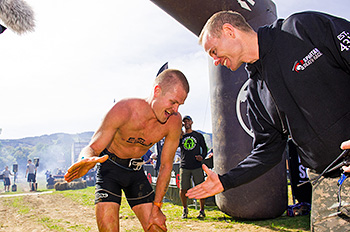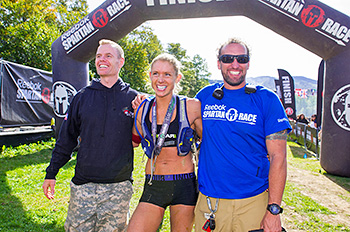
Joe De Sena '90 at Barton Hall on campus Nov. 22 to watch his two young sons participate in the Finger Lakes Wrestling Club Fall Festival tournament. Photo: Emily Sanders Hopkins.
Joe De Sena is living the Spartan Race philosophy

Joe De Sena '90 at the 2014 Reebok Spartan Race World Championship. Photo: Provided.
Spartan Race obstacle course mogul Joe De Sena '90 was in Barton Hall on Cornell's Ithaca campus a few mornings ago. The bleachers were half full, and the vast gymnasium was covered with wrestling mats. Young boys wrestled like puppies here and there, warming up for their real matches that were set to start later. Dozens of parents, mostly dads, stood around with their arms crossed, waiting, or milling around the entrance where the brackets and mat assignment sheets were taped to the cinderblock wall.
De Sena blended in with the other wrestling parents in their Carhart jackets, crew cuts and jeans. He'd arrived in Ithaca late the night before with his two young sons, plus a nephew, a wrestling coach and an assistant, for the Finger Lakes Wrestling Club Fall Festival tournament.
No matter how normal he looks at first glance, De Sena is anything but normal. In fact, he is waging something of a war on the whole idea of normal. Normal, he thinks, isn't cutting it.
He started his first business, a pool cleaning and construction company, at age 13, attended Cornell against the odds -- he had to apply four times before finally being accepted -- excelled as a trader on Wall Street, and completed more than 50 elite endurance races before age 40, including the Iditasport, a foot race along the famous 1,000-mile Iditarod Trail.
And since 2010, De Sena has presided over a growing empire of obstacle courses or "mud races" called the Spartan Race, which is now held in 17 countries around the world (Greece and Turkey are next, in 2015). The races attracted 650,000 competitors last year. In addition to its Reebok sponsorship, the Spartan Race has been racking up new corporate support in the past few months, including, De Sena said, Cliffbar, TomTom and Panasonic. "We don't have a car yet," he said.

Joe De Sena '90, right, with Matt Murphy at the 2013 Reebok Spartan Race World Championship in Vermont. Photo: Provided.
The Spartan Race, launched in Pittsfield, Vermont, is De Sena's second race company. His earlier, more extreme race, which he co-founded in 2005, was the Death Race, for which participants had to sign a waiver that read, simply: "I may die." While the Spartan Race is much less perilous, it is really hard -- that's the whole point of it and the reason racers love it. An average Spartan Race might include carrying cinderblocks up a mountain, climbing a greased wall, running 13 miles over rough outdoor terrain and throwing a spear.
The crux of De Sena's philosophy is that we can reset our happiness and stress barometers by putting ourselves through physically and mentally challenging outdoor endeavors that put us back in touch with our human capacity and with the natural world. An average American who gets stressed out about office politics or overcooked pasta is probably not challenging himself with 10-hour hikes up a mountain.
The Spartan Race's World Championship, in Vermont, was featured on a 90-minute NBC Sports special this fall. And De Sena is at work on a series of Spartan Race podcasts, to debut in January, in which he interviews successful people -- including Cornell wrestling coach Rob Koll and Sir Richard Branson, founder of Virgin Group.

From left, De Sena, Amelia Boone (of the Reebok Spartan Pro Team) and Norm Koch (domestic and international race director, known for his grueling course designs) at the 2013 Reebok Spartan Race World Championship. Photo: Provided.
"I don't want to say we've become mainstream because, in many ways, we are a reaction against the mainstream," De Sena wrote in his 2014 New York Times bestselling self-help memoir, "Spartan Up!"
"Spartan Race is now a big, popular business, and we're just getting started. We are changing lives daily. Participants email us, Tweet and Facebook us about how transformative an experience it was for them."
De Sena wrote the book with the help of Jeff O'Connell, and the two are now at work on a follow-up book, "Spartan Fit," which will detail De Sena's fitness recommendations. A preview: Run 10 miles at midnight. Take a quick lake swim in the winter to mix things up. And follow his lead by starting each day with an early morning, strenuous workout.
A troubled kid from Queens
Thirty years ago, De Sena was a troubled kid who had just moved from Queens to Ithaca with his newly divorced mother, Jean Marie DePalma. His father was a workaholic, and his mother was a long-distance runner who did yoga and meditated. Back then, De Sena wasn't thinking of college -- certainly not the Ivy League. But in his senior year of high school, a friend's father told them they should go to Cornell. De Sena applied but was soundly rejected. "I didn't have the grades or the SAT scores," he explains. But he enrolled in Cornell classes as a nonmatriculating student, in hopes that by doing well, he'd prove he was Cornell material. He ran straight up Gun Hill, one of the steepest hills in Ithaca, to classes and, on weekends, he traveled back to Queens to run his pool business.

De Sena, right, with Matt Novakovich, left (of the Reebok Spartan Pro Team) and another team member at PacWest Athletics in California. Photo: Provided.
When he was at last admitted to Cornell, it was to the College of Human Ecology, where he was one of only four men in his major -- fiber science and apparel design. While a student, he won an entrepreneurship prize for his idea to create a tougher hoodie, with metal threads. This year, he is finally putting that hoodie into production, in consultation with fiber experts in human ecology.
In 2002, De Sena purchased a spectroscope for his old department.
"The bottom line," he explains when asked about the gift, "was I had made some money and attributed my success to Anita [Racine, a lecturer in fashion design] accepting me into her program; so when she asked, I said 'yes.'"
He also said "yes" this month when asked for a generous gift to support Cornell's wrestling program and student and academic services.
De Sena has been in talks with the university on bringing the Spartan Race to Ithaca, and perhaps even to campus.
He is also at work developing a Spartan curriculum, which he hopes might make its way onto Cornell's and other schools' course list someday.
A very Spartan sentiment
At the wrestling tournament in Barton, De Sena's sons looked nervous, despite having both completed the Boston Marathon. Their wrestling coach, Brandon Escobar, who wrestled in the 2012 Olympic games for Honduras, was rubbing their shoulders and whispering advice. Each boy wrestled in three matches before the tournament was over; they won some and lost some. Escobar said to them afterward: "There are winners, and there are learners."
A very Spartan sentiment. Not that winning doesn't matter, but that winning is inevitable, in a way, if your commitment is unwavering.
"The rejection I received when I first applied to Cornell," De Sena recalls in his book, "stunned me, but failures like that are important in life, even if you don't realize it at the time. They humble us. They teach us lessons. Without that failure, I wouldn't have worked my ass off for the next two years doing whatever I could to gain entry to Cornell. Failure can be your greatest asset if you use it to move forward and progress."